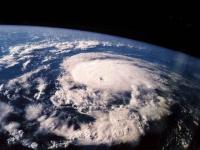A new study published by Greg Holland of the National Center for Atmospheric Research and Peter Webster of Georgia Institute of Technology has found that the number of hurricanes in the past 100 years has doubled. Altered wind patterns and rising surface sea temperatures (SST‘s) caused by global warming are the culprits. The team studied hurricane frequency from 1900 to 2005 and found 3 distinct periods in which hurricane activity increased sharply and then stabilized.
Debate does exist however, around the accuracy of the reporting based on the data available in the early part of the 20th century. National Hurricane Center’s Chris Landsea suggests that hurricane data gathering was less sophisticated in the early 1900’s and did not account for storms that didn’t touch land. By accounting for those activities, the sharp increases, he argues, may not actually exist.
We don’t have the answer to this one but we offer friend of DeSmogBlog and scientific journalist Chris Mooney’s take on the debate.
Subscribe to our newsletter
Stay up to date with DeSmog news and alerts







